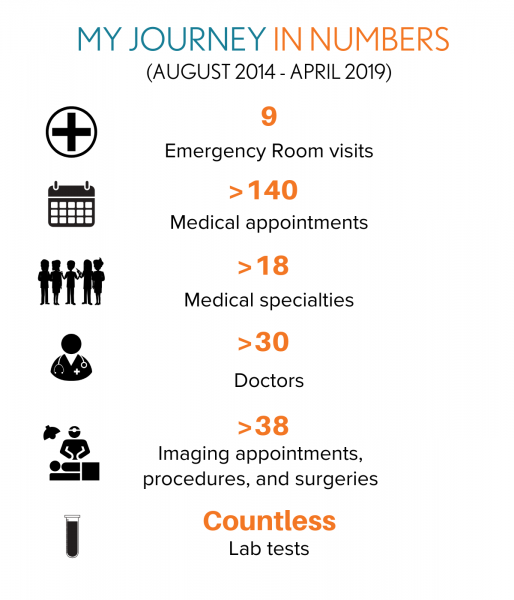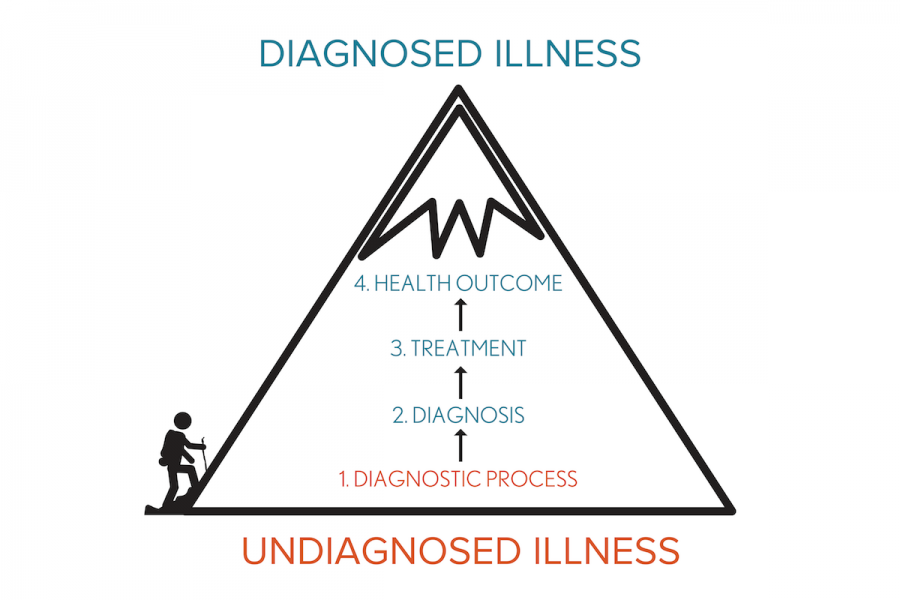The “tip of the iceberg” is an analogy I've used many times. Pain is much like the underbelly of an iceberg, with the most impressive and sizeable mass invisible below the surface. An estimated 1 in 5 Canadians - or more than 6 million of us - are living with a chronic pain condition; what we don’t know is how many of these people are living with a pain condition that is undiagnosed. According to the Undiagnosed Disease Network, “an undiagnosed disease is a medical condition without a known cause despite a lot of evaluation.” I am one of the unknown number of people living with pain from an undiagnosed disease and I want to share my story with you.
My journey down a path of the unknown and the biggest climb of my life began just over 4.5 years ago. At the time, I had a demanding career and was completing my master's degree; I had an active personal life and a passion for climbing mountains in my spare time. In fact, I had just returned from my second Kilimanjaro climb when I was suddenly struck with severe pain. My life and career came to a halt, as though someone pulled a carpet out from under my feet. It’s been 56 months since I began having ongoing abdominal pain, the duration and intensity more severe and overwhelming than I had ever previously experienced.
Why am I sharing my story?
Over my lifetime, I have come to expect that if you work hard enough at something, eventually you will succeed. I have brought the same attitude to this illness. I believe that if I try hard enough to find the answer to a question, the answer will come. My journey’s focus has been to search for the cause of this pain and return to my full and active life. Despite my and my doctor’s best efforts, my search for answers has not yet yielded a diagnosis.
In general, I’m not one to talk about myself, and I have been particularly hesitant to share my story as I don’t want to be defined by this undiagnosed illness. Prior to this blog, with the exception of sharing with my family and close friends, I have kept the challenges of being undiagnosed to myself. Being a strong believer in patient advocacy, I now feel the need to speak out and help increase awareness and understanding about the plight of undiagnosed people. My superstar doctors, incredible family and friends have given me strength, and I believe that by talking about this, others may see that they are not alone. Only together can we build a supportive community for people living with undiagnosed conditions.
 Where has the journey taken me so far?
Where has the journey taken me so far?
The first of my many emergency room visits happened in August 2014, at which time I was told I would need a few days off from work. While the doctors weren't sure what was wrong, they were hopeful it would get better. In the days and weeks that followed, I attended seemingly endless hours of appointments, seeing multiple doctors and specialists, travelling to and from appointments, and preparing notes for appointments. With the unrelenting pain, staying on top of these details has been wearing and exhausting. This long and winding road has included innumerable injections, lab work ups, imaging of all kinds, scopes, surgical procedures, a spinal tap, pain blocks, extensive testing and interventions, and countless time spent waiting. Where days turned into weeks, weeks turned into months, and months have now turned into years.
My life is completely different now compared to the energetic and active person I once was, and adjusting to my current reality has been tough. As I continue to battle debilitating pain, I remain engaged in my own care and hopeful a resolution will be found. I still wake up most days with the hope that it will disappear as fast as it came on. I have not yet been able to resume my career and my day-to-day function is dramatically reduced. The pain is unpredictable, and at times, it is so severe that I can hardly breathe, bringing tears to my eyes. In those moments, my resolve to accept an undiagnosed status goes out the window and I am determined that I will continue the search. There has to be an answer...
Despite our comprehensive health care system, I remain undiagnosed today, but I know that I am not alone. Did you know that according to the Rare and Undiagnosed Organization in the US, “1 in 10 Americans struggle with rare or undiagnosed conditions”? While medicine has progressed so much, there remain areas which have yet to be elicited. Please allow me to emphasize how incredible the valiant efforts of my many physicians have been in trying to find answers; I have been heard by my doctors, numerous investigations have taken place, and they continue to treat my symptoms. While a diagnosis still eludes them, they remain vigilant in trying to find one.
Why does this matter?
 Prior to my own lived experience, I had no idea it could be possible to "be" undiagnosed for an extended period, and I had no concept that this could ultimately lead to the ongoing daily struggles of dealing with stigma, loss of identity, isolation, scrutiny and a constant state of unknown. Even my doctors have expressed frustration.
Prior to my own lived experience, I had no idea it could be possible to "be" undiagnosed for an extended period, and I had no concept that this could ultimately lead to the ongoing daily struggles of dealing with stigma, loss of identity, isolation, scrutiny and a constant state of unknown. Even my doctors have expressed frustration.
In my opinion, the journey for people with undiagnosed illnesses varies greatly when compared to diagnosed illnesses. The following infographic captures what my undiagnosed journey has looked like so far, with a comparison to what I believe my journey - which has not yet progressed beyond the diagnostic process - would have looked like had I received a diagnosis.
Each new investigation is like an emotional roller coaster. I feel such optimism given the efforts of my dedicated doctors’ steadfast determination to find answers, and constant hope to be a step closer to a diagnosis or finding an important clue to keep the search moving forward. On one hand, I feel relieved as many diseases and conditions get ruled out, and at the same time, frustrated from remaining undiagnosed. My condition has not changed and there are still no answers, and no clear path forward.
My pain is often invisible to people. On bad days - when the breathing, lying down, resting and other pain management strategies aren't working - it may be obvious that something is wrong and that I’m not well even though I try very hard to hide it. On good days, for people who don’t know me, they may see me and say “you look good, all solved?”. What they don't realize is that I would have rested for hours in order to be able to engage in a single activity that day.
Stigma is pervasive. Many people around me are caring, but some can be cruel. For these people, there is more suspicion than understanding. If they don't see it, they think it doesn’t exist. They assume that because I am not ‘labelled’, my symptoms are not real. This makes my reality of not knowing the answers only tougher.
My family and friends have been there all the way, encouraging me and supporting me. They know first-hand the impact my undiagnosed illness has on me and see how much it takes out of me.
Living with an undiagnosed illness feels like driving in a foreign country without GPS or a map - you simply don't know what’s around the corner and when you get around it, you don't know why it looks the way it does or where the road goes to next. That’s how I feel about the lack of clarity in being undiagnosed. Having a diagnosis would mean having answers to simple questions: “What is the cause of this condition?”, ”Why do I have pain?”, “What can be done about this?”, and “Will I be like this for the rest of my life?”
Despite our label-focused society, many people in our country and around the world, do not and may never have a name for their suffering. Bottom line, not everything has a label but that doesn’t make it less valid or miserable.
Where do I go from here?
I feel fortunate to be where I am today - that is, compared to what I thought I was heading towards. In the beginning, I thought this illness was the beginning of my end, but I’ve made progress. I have. I’m learning to manage the pain better and I focus on what I can control: nutrition, movement, and ‘being as normal’ as possible. I try to make each day important and the best it can be; I am learning to accept the day by day and seeking new ways forward.
If my fate is to remain undiagnosed, I will persevere in seeking answers and sharing my experience. My only hope is that I’ll one day be able to predict when the really bad episodes come and this crazy thing veers it’s incredibly ugly head.
Over the years, I’ve often been commended for my resilience in my work and other aspects of my life. Never has it been more important than now. I am learning to tolerate the ambiguity. And still, I have hope.
By: Jennifer Daly-Cyr, a person living with pain
To follow the conversation on undiagnosed pain, search for #UndiagnosedDay and #RareUndiagnosed on Twitter, Facebook or any other social media platform you use.